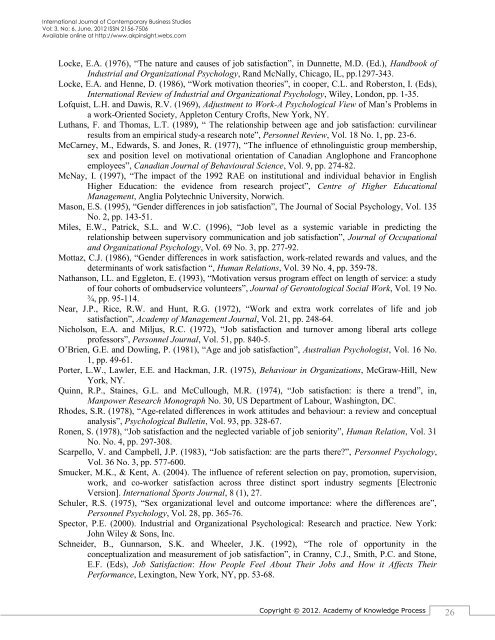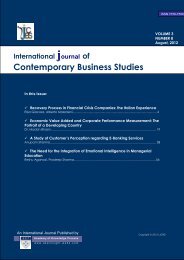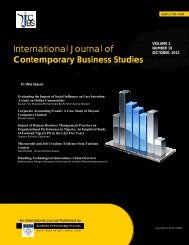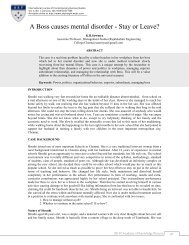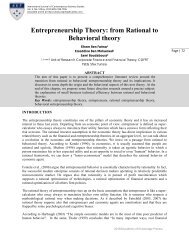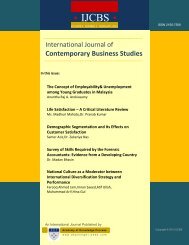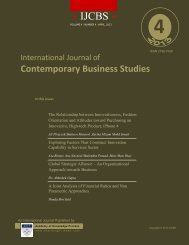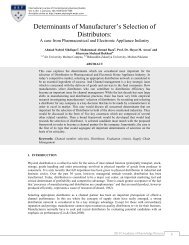International journal of Contemporary Business Studies
International journal of Contemporary Business Studies
International journal of Contemporary Business Studies
Create successful ePaper yourself
Turn your PDF publications into a flip-book with our unique Google optimized e-Paper software.
<strong>International</strong> Journal <strong>of</strong> <strong>Contemporary</strong> <strong>Business</strong> <strong>Studies</strong><br />
Vol: 3, No: 6. June, 2012 ISSN 2156-7506<br />
Available online at http://www.akpinsight.webs.com<br />
Locke, E.A. (1976), “The nature and causes <strong>of</strong> job satisfaction”, in Dunnette, M.D. (Ed.), Handbook <strong>of</strong><br />
Industrial and Organizational Psychology, Rand McNally, Chicago, IL, pp.1297-343.<br />
Locke, E.A. and Henne, D. (1986), “Work motivation theories”, in cooper, C.L. and Roberston, I. (Eds),<br />
<strong>International</strong> Review <strong>of</strong> Industrial and Organizational Psychology, Wiley, London, pp. 1-35.<br />
L<strong>of</strong>quist, L.H. and Dawis, R.V. (1969), Adjustment to Work-A Psychological View <strong>of</strong> Man‟s Problems in<br />
a work-Oriented Society, Appleton Century Cr<strong>of</strong>ts, New York, NY.<br />
Luthans, F. and Thomas, L.T. (1989), “ The relationship between age and job satisfaction: curvilinear<br />
results from an empirical study-a research note”, Personnel Review, Vol. 18 No. 1, pp. 23-6.<br />
McCarney, M., Edwards, S. and Jones, R. (1977), “The influence <strong>of</strong> ethnolinguistic group membership,<br />
sex and position level on motivational orientation <strong>of</strong> Canadian Anglophone and Francophone<br />
employees”, Canadian Journal <strong>of</strong> Behavioural Science, Vol. 9, pp. 274-82.<br />
McNay, I. (1997), “The impact <strong>of</strong> the 1992 RAE on institutional and individual behavior in English<br />
Higher Education: the evidence from research project”, Centre <strong>of</strong> Higher Educational<br />
Management, Anglia Polytechnic University, Norwich.<br />
Mason, E.S. (1995), “Gender differences in job satisfaction”, The Journal <strong>of</strong> Social Psychology, Vol. 135<br />
No. 2, pp. 143-51.<br />
Miles, E.W., Patrick, S.L. and W.C. (1996), “Job level as a systemic variable in predicting the<br />
relationship between supervisory communication and job satisfaction”, Journal <strong>of</strong> Occupational<br />
and Organizational Psychology, Vol. 69 No. 3, pp. 277-92.<br />
Mottaz, C.J. (1986), “Gender differences in work satisfaction, work-related rewards and values, and the<br />
determinants <strong>of</strong> work satisfaction “, Human Relations, Vol. 39 No. 4, pp. 359-78.<br />
Nathanson, I.L. and Eggleton, E. (1993), “Motivation versus program effect on length <strong>of</strong> service: a study<br />
<strong>of</strong> four cohorts <strong>of</strong> ombudservice volunteers”, Journal <strong>of</strong> Gerontological Social Work, Vol. 19 No.<br />
¾, pp. 95-114.<br />
Near, J.P., Rice, R.W. and Hunt, R.G. (1972), “Work and extra work correlates <strong>of</strong> life and job<br />
satisfaction”, Academy <strong>of</strong> Management Journal, Vol. 21, pp. 248-64.<br />
Nicholson, E.A. and Miljus, R.C. (1972), “Job satisfaction and turnover among liberal arts college<br />
pr<strong>of</strong>essors”, Personnel Journal, Vol. 51, pp. 840-5.<br />
O‟Brien, G.E. and Dowling, P. (1981), “Age and job satisfaction”, Australian Psychologist, Vol. 16 No.<br />
1, pp. 49-61.<br />
Porter, L.W., Lawler, E.E. and Hackman, J.R. (1975), Behaviour in Organizations, McGraw-Hill, New<br />
York, NY.<br />
Quinn, R.P., Staines, G.L. and McCullough, M.R. (1974), “Job satisfaction: is there a trend”, in,<br />
Manpower Research Monograph No. 30, US Department <strong>of</strong> Labour, Washington, DC.<br />
Rhodes, S.R. (1978), “Age-related differences in work attitudes and behaviour: a review and conceptual<br />
analysis”, Psychological Bulletin, Vol. 93, pp. 328-67.<br />
Ronen, S. (1978), “Job satisfaction and the neglected variable <strong>of</strong> job seniority”, Human Relation, Vol. 31<br />
No. No. 4, pp. 297-308.<br />
Scarpello, V. and Campbell, J.P. (1983), “Job satisfaction: are the parts there?”, Personnel Psychology,<br />
Vol. 36 No. 3, pp. 577-600.<br />
Smucker, M.K., & Kent, A. (2004). The influence <strong>of</strong> referent selection on pay, promotion, supervision,<br />
work, and co-worker satisfaction across three distinct sport industry segments [Electronic<br />
Version]. <strong>International</strong> Sports Journal, 8 (1), 27.<br />
Schuler, R.S. (1975), “Sex organizational level and outcome importance: where the differences are”,<br />
Personnel Psychology, Vol. 28, pp. 365-76.<br />
Spector, P.E. (2000). Industrial and Organizational Psychological: Research and practice. New York:<br />
John Wiley & Sons, Inc.<br />
Schneider, B., Gunnarson, S.K. and Wheeler, J.K. (1992), “The role <strong>of</strong> opportunity in the<br />
conceptualization and measurement <strong>of</strong> job satisfaction”, in Cranny, C.J., Smith, P.C. and Stone,<br />
E.F. (Eds), Job Satisfaction: How People Feel About Their Jobs and How it Affects Their<br />
Performance, Lexington, New York, NY, pp. 53-68.<br />
Copyright © 2012. Academy <strong>of</strong> Knowledge Process<br />
26


